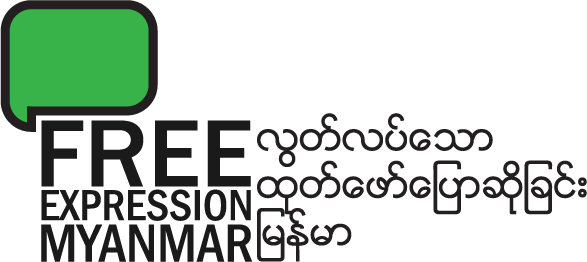Repeal 66(d) to protect legal constitutionality, non-duplication and clarity — ဖွဲ့စည်းပုံအခြေခံဥပဒေပါ ပြဌာန်းချက်၊ ပုံစံတူဥပဒေများထပ်မနေစေခြင်း နှင့် ရှင်းလင်းပြတ်သားခြင်းကို ကာကွယ်ရန် ၆၆(ဃ) ကို အပြီးတိုင်ဖျက်သိမ်းပါ။
As lawyers and legal advocates working on cases relating to the media, internet and freedom of expression in Myanmar, Free Expression Myanmar (FEM), Myanmar Media Legal Network (MMLN), Hygienic Legal Clinic call on Members of Parliament and the Parliamentary Bill Committees to use the opportunity of reviewing the Government’s Telecommunications Law Amendment Bill to fully repeal Article 66(d).
Article 66(d) of the Telecommunications Law is legally problematic for three reasons:
- 66(d) is unconstitutional – it conflicts with Myanmar Constitution Article 354 which guarantees every citizen the right to “express and publish freely their convictions and opinions”. International and regional standards allow for limitations to freedom of expression such as in regards to defamation, but require any limitations to be clearly and narrowly defined in the law. Article 66(d) is unconstitutional because it is neither clear nor narrowly defined, and this vagueness renders Article 354 meaningless.
- 66(d) is unnecessary duplication – defamation is already provided for under Myanmar Penal Code Articles 499-502 which equally applies online as it does offline. Any complainant of online defamation can therefore remedy their case under the Penal Code. Article 66(d) is legally unnecessary and instead of providing rights to complainants, actually creates legal conflict and confusion. International and regional best practice on good legislative frameworks require governments to simplify laws and remove confusion wherever possible.
- 66(d) is bad legal drafting - the correct place for all of the criminal offences listed under Chapter 18 of the Telecommunications Law, including Article 66(d), is the Myanmar Penal Code. International and regional standards on good legal drafting include the principle that laws should be clear to those who are affected by them, and this includes ensuring that criminal offences are placed in laws where the public is likely to find them.
We call on Members of Parliament and the Parliamentary Bill Committees to modify the government’s draft Telecommunications Law Amendment Bill to fully repeal Article 66(d).
Signed,
Advocate Aung Soe, on behalf of Myanmar Media Lawyers Network www.myanmarmedialawyers.org
Advocate Robert San Aung, on behalf of Hygienic Legal Clinic https://en-gb.facebook.com/hygienic.legal.clinic/
Yin Yadanar Thein, on behalf of Free Expression Myanmar https://freeexpressionmyanmar.org/
Free Expression Myanmar (FEM) and Myanmar Media Lawyer Network (MMLN) are the members of The Telecommunications Law Reform Coalition Group.
ပြီးခဲ့သည့်ရက်အတွင်းက ထုတ်ပြန်ခဲ့သည် အစိုးရ၏ ဆက်သွယ်ရေးဥပဒေပြင်ဆင်ရေးမူကြမ်းကို လေ့လာသုံးသပ် စစ်ဆေးနိုင်သော အခွင့်အရေးကို အသုံးပြုလျက် ပုဒ်မ ၆၆(ဃ) ကို အပြီးတိုင်ဖျက်သိမ်းပေးပါရန် မြန်မာနိုင်ငံတွင်း မီဒီယာ၊ အင်တာနက်နှင့် လွတ်လပ်စွာရေးသားထုတ်ဖော်ပြောဆိုခြင်း အရေးကိစ္စများကို ဆောင်ရွက် လုပ်ကိုင်နေသော ရှေ့နေများ အနေဖြင့် မြန်မာမီဒီယာရှေ့နေများကွန်ယက် (MMLN)၊ Hygienic Legal Clinic နှင့် လွတ်လပ်သောထုတ်ဖော်ပြောဆိုခြင်း မြန်မာ (FEM) တို့မှ လွှတ်တော်အမတ်များနှင့် လွှတ်တော် ဥပဒေကြမ်း ကော်မတီအား တောင်းဆိုလိုက်ပါသည်။ ပုဒ်မ ၆၆(ဃ) သည် အောက်ပါ အကြောင်းအရင်း သုံးခုအတွက် ဥပဒေဆိုင်ရာ ပြသနာဖြစ်နေပါသည်။
၁) ပုဒ်မ ၆၆(ဃ) သည် ဖွဲ့စည်းပုံအခြေခံဥပဒေနှင့် ကိုက်ညီမှုမရှိပါ - ၄င်းသည် ဖွဲ့စည်းပုံအခြေခံဥပဒေ ပုဒ်မ ၃၅၄ က အာမခံချက်ပေးထားသော နိုင်ငံသားတိုင်းသည် “မိမိ၏ ယုံကြည်ချက်၊ ထင်မြင်ယူဆချက်များကို လွတ်လပ်စွာ ရေးသား ထုတ်ဖော်ခွင့်” ရှိသည် ဆိုသည့် ပြဌာန်းချက်နှင့် ပဋိပက္ခဖြစ်နေသည်။ နိုင်ငံတကာ နှင့် ဒေသတွင်းစံနှုန်းများက အသရေဖျက်မှုနှင့် ပတ်သတ်၍ လွတ်လပ်စွာထုတ်ဖော်ပြောဆိုခြင်းဆိုင်ရာ ကန့်သတ်ချက်များကို ခွင့်ပြုထားသည်။ သို့သော် မည်သည့်ကန့်သတ်ချက်မဆို အဓိပ္ပါယ်ဖွင့်ဆိုချက် ရှင်းလင်းပြတ်သားရန်နှင့် ကန့်သတ်ချက်ကို ကျဉ်းနိုင်သမျှ ကျဉ်းရန် လိုအပ်ကြောင်း ပြဆိုထားပြီးလည်းဖြစ်သည်။ ပုဒ်မ ၆၆(ဃ) သည် အဓိပ္ပါယ် ရှင်းလင်းပြတ်သားမှု မရှိခြင်း၊ ကန့်သတ်ချက်သည်လည်း ကျဉ်းမြောင်းခြင်းမရှိဘဲ ကျယ်ပြန့်နေခြင်း နှင့် ယင်း ဝေဝါးမှုသည် ဖွဲ့စည်းပုံပါ ပုဒ်မ ၃၅၄ကို အဓိပ္ပါယ်ကင်းမဲ့စေခြင်း စသည်တို့ကြောင့် ဖွဲ့စည်းပုံအခြေခံဥပဒေနှင့် ကိုက်ညီမှုမရှိပါ။
၂) ပုဒ်မ ၆၆(ဃ) သည် မလိုအပ်သော ပုံစံတူဥပဒေပြုခြင်းဖြစ်သည် - အသရေဖျက်မှုသည် မြန်မာရာဇသတ်ကြီး ဥပဒေပုဒ်မ ၄၉၉ မှ ၅၀၂ တွင် ပြဌာန်းပြီးဖြစ်သလို ၄င်းသည် အွန်လိုင်းတွင်သာမက အွန်လိုင်းပြင်ပတွင်လည်း တူညီစွာ သက်ရောက်မှုရှိသည်။ မည်သည့် အွန်လိုင်းအသရေဖျက်မှု တိုင်တန်းချက်မဆို ၄င်းတို့၏ အမှုကို ရာဇသတ်ကြီးဥပဒေ ပြဌန်းချက်အောက်တွင် စီရင်နိုင်သည်။ ပုဒ်မ ၆၆(ဃ) သည် ဥပဒေကြောင်းအရ မလိုအပ်ဘဲ၊ အမှုဖွင့်တိုင်တန်းခွင့်ကို ထောက်ပံ့ပေးခြင်းထက် တကယ်တမ်းတွင် ဥပဒေဆိုင်ရာပဋိပက္ခနှင့် ရှုပ်ထွေးမှုများကိုသာ ဖန်တီးပေးသည်။ ကောင်းမွန် သော ဥပဒေပြုရေး မူဘောင်များအတွက် နို်င်ငံတကာနှင့် ဒေသတွင်း အကောင်းဆုံးကျင့်ထုံးအရ လိုအပ်သည်မှာ အစိုးရမှ ဥပဒေများကို ရိုးရှင်းစေပြီး ရှုပ်ထွေးဝေဝါးမှုများကို တတ်နိုင်သမျှ ဖျက်သိမ်းဖယ်ရှားပစ်ရန် ဖြစ်သည်။
၃) ပုဒ်မ ၆၆(ဃ) သည် ဆိုးရွားသော ဥပဒေကြမ်းပြုစုခြင်းဖြစ်သည် - ဆက်သွယ်ရေးဥပဒေ အခန်း (၁၈) အောက်တွင် ရှိသမျှသော ပုဒ်မ ၆၆(ဃ) အပါအဝင် ရာဇဝတ်ဥပဒေများအတွက် နေရာမှန်မှာ မြန်မာနိုင်ငံရာဇသတ်ကြီး ဥပဒေပင် ဖြစ်သည်။ ကောင်းမွန်သော ဥပဒေကြမ်းရေးသားပြုစုခြင်းဆိုင်ရာ နိုင်ငံတကာနှင့် ဒေသတွင်းစံနှုန်းတွင် ဥပဒေ သက်ရောက်ခြင်းခံရသော လူများအတွက် ဥပဒေသည် ရှင်းလင်းပြတ်သားရန်လိုအပ်ကြောင်း မူဝါဒကို ထည့်သွင်း ထားသည်။ ယင်းမူဝါဒတွင် ရာဇဝတ်မှုဆိုင်ရာပြစ်မှုများကို ပြည်သူများ အများဆုံး ရှာဖွေတွေ့ရှိမည့် ဥပဒေများတွင် ပြဌန်းထားရှိရန် သေချာစေရမည်ဟုလည်း ထည့်သွင်းဖော်ပြထားသည်။
ထို့ကြောင့် လွှတ်တော်အမတ်များနှင့် လွှတ်တော်ဥပဒေကြမ်းကော်မတီတို့ကို အစိုးရ၏ ဆက်သွယ်ရေးဥပဒေပြင်ဆင်ရေး မူကြမ်းအား ပိုမိုကောင်းမွန်ထိရောက်အောင် ပြင်ဆင်ရန် နှင့် ပုဒ်မ ၆၆ (ဃ)ကို လုံးဝဖျက်သိမ်းပေးပါရန် တောင်းဆို လိုက်ပါသည်။
ရှေ့နေ ဦးအောင်စိုး (မြန်မာမီဒီယာရှေ့နေများကွန်ယက်ကိုယ်စားပြု) www.myanmarmedialawyers.org
ရှေ့နေ ဦးရောဘတ်စန်းအောင် (Hygienic Legal Clinic ကိုယ်စားပြု) https://en-gb.facebook.com/hygienic.legal.clinic/
ယဉ်ရတနာသိန်း (လွတ်လပ်သောထုတ်ဖော်ပြောဆိုခြင်း မြန်မာ ကိုယ်စားပြု) https://freeexpressionmyanmar.org/
လွတ်လပ်သောထုတ်ဖော်ပြောဆိုခြင်း မြန်မာ (FEM) နှင့် မြန်မာမီဒီယာရှေ့နေများကွန်ယက် (MMLN) တို့သည် ဆက်သွယ်ရေး ဥပဒေပြင်ဆင်ရေးပူးပေါင်းအဖွဲ့၏ အဖွဲ့ဝင်များဖြစ်ကြသည်။
